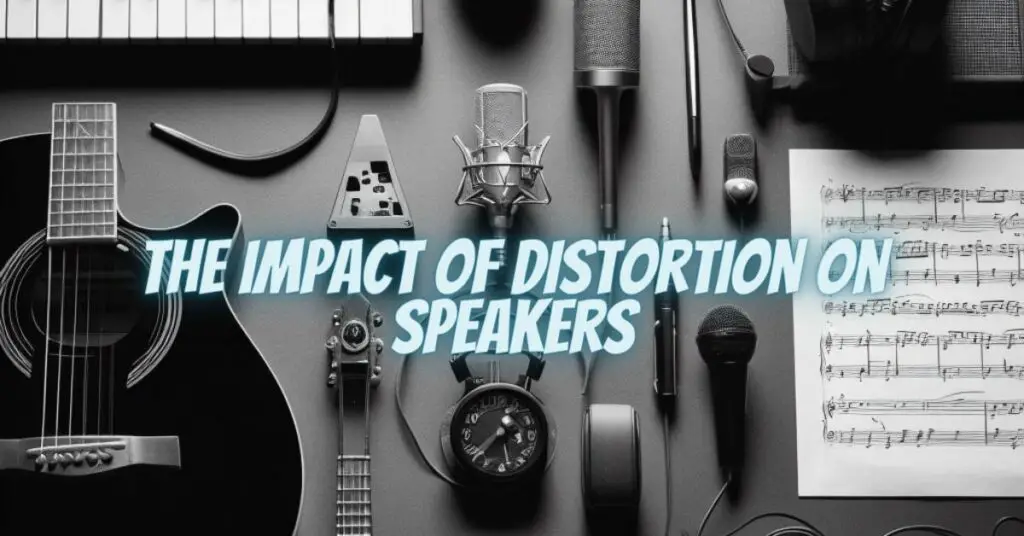Whether or not distortion damages speakers is a complex question with no easy answer. There are a number of factors to consider, such as the type of distortion, the volume of the distortion, the quality of the speakers, and the duration of exposure.
What is distortion?
Distortion is any unwanted alteration of the audio signal. It can be caused by a variety of factors, including:
- Clipping: This occurs when the audio signal is too loud and is cut off at the peaks. Clipping is often characterized by a harsh, buzzy sound.
- Overloading: This occurs when too much power is sent to the speakers. Overloading can cause the speakers to move too far, which can damage the suspension and the cone.
- Resonance: This occurs when the speakers vibrate at a frequency that is close to their natural resonant frequency. Resonance can cause the speakers to vibrate excessively, which can damage the suspension and the cone.
How can distortion damage speakers?
Distortion can damage speakers in a number of ways:
- Clipping: Clipping can cause the speakers to overheat, which can damage the voice coils. Voice coils are the wires that convert electrical signals into mechanical energy, which causes the speakers to move.
- Overloading: Overloading can cause the speakers to move too far, which can damage the suspension and the cone. The suspension is the flexible material that surrounds the cone and keeps it centered. The cone is the part of the speaker that vibrates to produce sound.
- Resonance: Resonance can cause the speakers to vibrate excessively, which can damage the suspension and the cone.
How long does it take distortion to damage speakers?
The amount of time it takes distortion to damage speakers depends on a number of factors, including the type of distortion, the volume of the distortion, and the quality of the speakers. In general, however, it is best to avoid playing music at high volumes with distortion, as this can quickly damage your speakers.
How to prevent speaker damage from distortion
There are a number of things you can do to prevent speaker damage from distortion:
- Avoid playing music at high volumes.
- Make sure that your amplifier is not overloaded.
- Use high-quality speakers that can handle the amount of power you are sending them.
- Be aware of the resonant frequencies of your speakers and avoid playing music at those frequencies.
If you think you may have damaged your speakers
If you think you may have damaged your speakers from distortion, it is important to have them inspected by a qualified technician. The technician will be able to assess the damage and recommend a course of action. In some cases, the speakers may be repaired. In other cases, they may need to be replaced.
General tips for taking care of your speakers
In addition to avoiding distortion, there are a number of other things you can do to take care of your speakers:
- Keep your speakers clean. Use a dry cloth or a vacuum cleaner to remove dust and dirt.
- Avoid placing your speakers in direct sunlight or in humid environments.
- Be careful not to bump or drop your speakers.
- If you are not using your speakers for a period of time, cover them with a dust cloth.
By following these tips, you can help to ensure that your speakers last for many years to come.
It is important to note that not all distortion is created equal. Some types of distortion are more harmful to speakers than others. For example, clipping is generally considered to be the most harmful type of distortion, as it can quickly cause the speakers to overheat. Other types of distortion, such as harmonic distortion, are less harmful to speakers.
It is also important to note that the quality of the speakers can play a role in how susceptible they are to damage from distortion. High-quality speakers are generally more resistant to damage from distortion than low-quality speakers.
Finally, it is important to note that the duration of exposure to distortion can also play a role in how likely it is to damage speakers. Speakers that are exposed to distortion for long periods of time are more likely to be damaged than speakers that are only exposed to distortion for short periods of time.
If you are concerned about damaging your speakers from distortion, it is best to err on the side of caution and avoid playing music at high volumes with distortion. You can also use a high-pass filter to remove the lowest frequencies from your music, as these frequencies are more likely to cause distortion.


